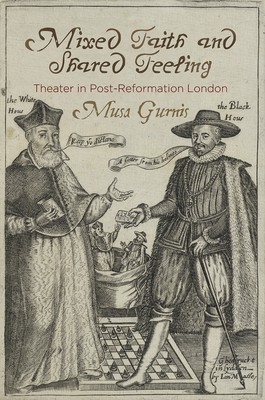
- We will send in 10–14 business days.
- Author: Musa Gurnis
- Publisher: University of Pennsylvania Press
- ISBN-10: 0812250257
- ISBN-13: 9780812250251
- Format: 16 x 23.1 x 3.1 cm, hardcover
- Language: English
- SAVE -10% with code: EXTRA
Reviews
Description
Mixed Faith and Shared Feeling explores the mutually generative relationship between post-Reformation religious life and London's commercial theaters. It explores the dynamic exchange between the imaginatively transformative capacities of shared theatrical experience, with the particular ideological baggage that individual playgoers bring into the theater. While early modern English drama was shaped by the polyvocal, confessional scene in which it was embedded, Musa Gurnis contends that theater does not simply reflect culture but shapes it. According to Gurnis, shared theatrical experience allowed mixed-faith audiences to vicariously occupy alternative emotional and cognitive perspectives across the confessional spectrum.
In looking at individual plays, such as Thomas Middleton's A Game of Chess and Shakespeare's Measure for Measure, Gurnis shows how theatrical process can restructure playgoers' experiences of confessional material and interrupt dominant habits of religious thought. She refutes any assumption that audiences consisted of conforming Church of England Protestants by tracking the complex and changing religious lives of seventy known playgoers. Arguing against work that seeks to draw fixed lines of religious affiliation around individual playwrights or companies, she highlights the common practice of cross-confessional collaboration among playhouse colleagues. Mixed Faith and Shared Feeling demonstrates how post-Reformation representational practices actively reshaped the ways ideologically diverse Londoners accessed the mixture of religious life across the spectrum of beliefs.EXTRA 10 % discount with code: EXTRA
The promotion ends in 18d.04:40:37
The discount code is valid when purchasing from 10 €. Discounts do not stack.
- Author: Musa Gurnis
- Publisher: University of Pennsylvania Press
- ISBN-10: 0812250257
- ISBN-13: 9780812250251
- Format: 16 x 23.1 x 3.1 cm, hardcover
- Language: English English
Mixed Faith and Shared Feeling explores the mutually generative relationship between post-Reformation religious life and London's commercial theaters. It explores the dynamic exchange between the imaginatively transformative capacities of shared theatrical experience, with the particular ideological baggage that individual playgoers bring into the theater. While early modern English drama was shaped by the polyvocal, confessional scene in which it was embedded, Musa Gurnis contends that theater does not simply reflect culture but shapes it. According to Gurnis, shared theatrical experience allowed mixed-faith audiences to vicariously occupy alternative emotional and cognitive perspectives across the confessional spectrum.
In looking at individual plays, such as Thomas Middleton's A Game of Chess and Shakespeare's Measure for Measure, Gurnis shows how theatrical process can restructure playgoers' experiences of confessional material and interrupt dominant habits of religious thought. She refutes any assumption that audiences consisted of conforming Church of England Protestants by tracking the complex and changing religious lives of seventy known playgoers. Arguing against work that seeks to draw fixed lines of religious affiliation around individual playwrights or companies, she highlights the common practice of cross-confessional collaboration among playhouse colleagues. Mixed Faith and Shared Feeling demonstrates how post-Reformation representational practices actively reshaped the ways ideologically diverse Londoners accessed the mixture of religious life across the spectrum of beliefs.

Reviews